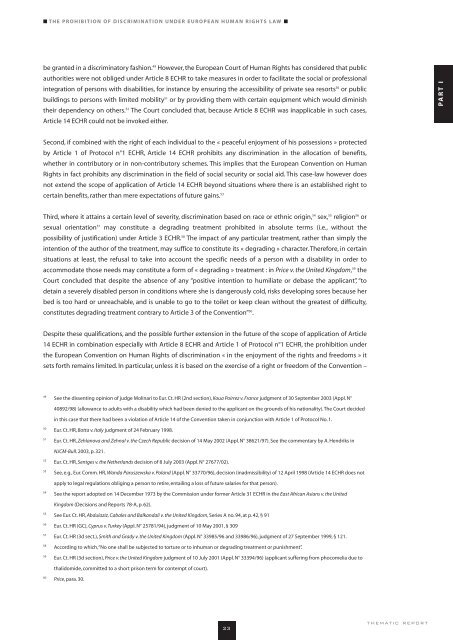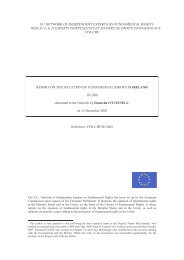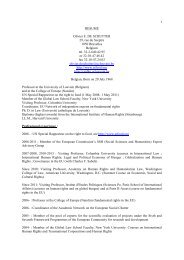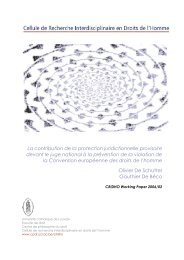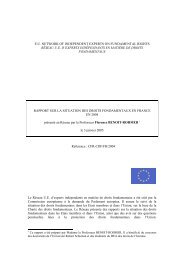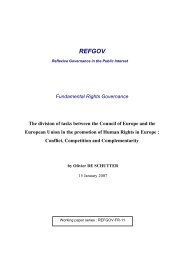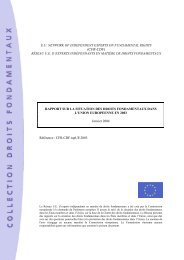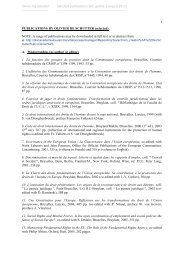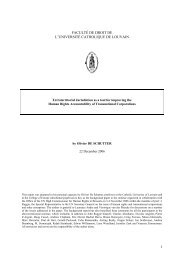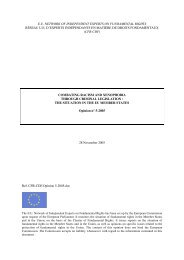The Prohibition of Discrimination under European Human ... - cridho
The Prohibition of Discrimination under European Human ... - cridho
The Prohibition of Discrimination under European Human ... - cridho
Create successful ePaper yourself
Turn your PDF publications into a flip-book with our unique Google optimized e-Paper software.
■ THE PROHIBITION OF DISCRIMINATION UNDER EUROPEAN HUMAN RIGHTS LAW ■<br />
be granted in a discriminatory fashion. 49 However, the <strong>European</strong> Court <strong>of</strong> <strong>Human</strong> Rights has considered that public<br />
authorities were not obliged <strong>under</strong> Article 8 ECHR to take measures in order to facilitate the social or pr<strong>of</strong>essional<br />
integration <strong>of</strong> persons with disabilities, for instance by ensuring the accessibility <strong>of</strong> private sea resorts50 or public<br />
buildings to persons with limited mobility51 or by providing them with certain equipment which would diminish<br />
their dependency on others. 52 <strong>The</strong> Court concluded that, because Article 8 ECHR was inapplicable in such cases,<br />
Article 14 ECHR could not be invoked either.<br />
Second, if combined with the right <strong>of</strong> each individual to the « peaceful enjoyment <strong>of</strong> his possessions » protected<br />
by Article 1 <strong>of</strong> Protocol n°1 ECHR, Article 14 ECHR prohibits any discrimination in the allocation <strong>of</strong> benefits,<br />
whether in contributory or in non-contributory schemes. This implies that the <strong>European</strong> Convention on <strong>Human</strong><br />
Rights in fact prohibits any discrimination in the field <strong>of</strong> social security or social aid. This case-law however does<br />
not extend the scope <strong>of</strong> application <strong>of</strong> Article 14 ECHR beyond situations where there is an established right to<br />
certain benefits, rather than mere expectations <strong>of</strong> future gains. 53<br />
Third, where it attains a certain level <strong>of</strong> severity, discrimination based on race or ethnic origin, 54 sex, 55 religion56 or<br />
sexual orientation57 may constitute a degrading treatment prohibited in absolute terms (i.e., without the<br />
possibility <strong>of</strong> justification) <strong>under</strong> Article 3 ECHR. 58 <strong>The</strong> impact <strong>of</strong> any particular treatment, rather than simply the<br />
intention <strong>of</strong> the author <strong>of</strong> the treatment, may suffice to constitute its « degrading » character. <strong>The</strong>refore, in certain<br />
situations at least, the refusal to take into account the specific needs <strong>of</strong> a person with a disability in order to<br />
accommodate those needs may constitute a form <strong>of</strong> « degrading » treatment : in Price v. the United Kingdom, 59 the<br />
Court concluded that despite the absence <strong>of</strong> any “positive intention to humiliate or debase the applicant”,“to<br />
detain a severely disabled person in conditions where she is dangerously cold, risks developing sores because her<br />
bed is too hard or unreachable, and is unable to go to the toilet or keep clean without the greatest <strong>of</strong> difficulty,<br />
constitutes degrading treatment contrary to Article 3 <strong>of</strong> the Convention” 60 .<br />
Despite these qualifications, and the possible further extension in the future <strong>of</strong> the scope <strong>of</strong> application <strong>of</strong> Article<br />
14 ECHR in combination especially with Article 8 ECHR and Article 1 <strong>of</strong> Protocol n°1 ECHR, the prohibition <strong>under</strong><br />
the <strong>European</strong> Convention on <strong>Human</strong> Rights <strong>of</strong> discrimination « in the enjoyment <strong>of</strong> the rights and freedoms » it<br />
sets forth remains limited. In particular, unless it is based on the exercise <strong>of</strong> a right or freedom <strong>of</strong> the Convention –<br />
49<br />
50<br />
51<br />
52<br />
53<br />
54<br />
55<br />
56<br />
57<br />
58<br />
59<br />
60<br />
See the dissenting opinion <strong>of</strong> judge Molinari to Eur. Ct. HR (2nd section), Koua Poirrez v. France judgment <strong>of</strong> 30 September 2003 (Appl. N°<br />
40892/98) (allowance to adults with a disability which had been denied to the applicant on the grounds <strong>of</strong> his nationality).<strong>The</strong> Court decided<br />
in this case that there had been a violation <strong>of</strong> Article 14 <strong>of</strong> the Convention taken in conjunction with Article 1 <strong>of</strong> Protocol No. 1.<br />
Eur. Ct. HR, Botta v. Italy judgment <strong>of</strong> 24 February 1998.<br />
Eur. Ct. HR, Zehlanova and Zehnal v. the Czech Republic decision <strong>of</strong> 14 May 2002 (Appl. N° 38621/97). See the commentary by A. Hendriks in<br />
NJCM-Bull. 2003, p. 321.<br />
Eur. Ct. HR, Sentges v. the Netherlands decision <strong>of</strong> 8 July 2003 (Appl. N° 27677/02).<br />
See, e.g., Eur. Comm. HR, Wanda Paruszewska v. Poland (Appl. N° 33770/96), decision (inadmissibility) <strong>of</strong> 12 April 1998 (Article 14 ECHR does not<br />
apply to legal regulations obliging a person to retire, entailing a loss <strong>of</strong> future salaries for that person).<br />
See the report adopted on 14 December 1973 by the Commission <strong>under</strong> former Article 31 ECHR in the East African Asians v. the United<br />
Kingdom (Decisions and Reports 78-A, p. 62).<br />
See Eur. Ct. HR, Abdulaziz, Cabales and Balkandali v. the United Kingdom, Series A no. 94, at p. 42, § 91<br />
Eur. Ct. HR (GC), Cyprus v.Turkey (Appl. N° 25781/94), judgment <strong>of</strong> 10 May 2001, § 309<br />
Eur. Ct. HR (3d sect.), Smith and Grady v. the United Kingdom (Appl. N° 33985/96 and 33986/96), judgment <strong>of</strong> 27 September 1999, § 121.<br />
According to which,“No one shall be subjected to torture or to inhuman or degrading treatment or punishment”.<br />
Eur. Ct. HR (3d section), Price v. the United Kingdom judgment <strong>of</strong> 10 July 2001 (Appl. N° 33394/96) (applicant suffering from phocomelia due to<br />
thalidomide, committed to a short prison term for contempt <strong>of</strong> court).<br />
Price, para. 30.<br />
23<br />
thematic report<br />
PART I


